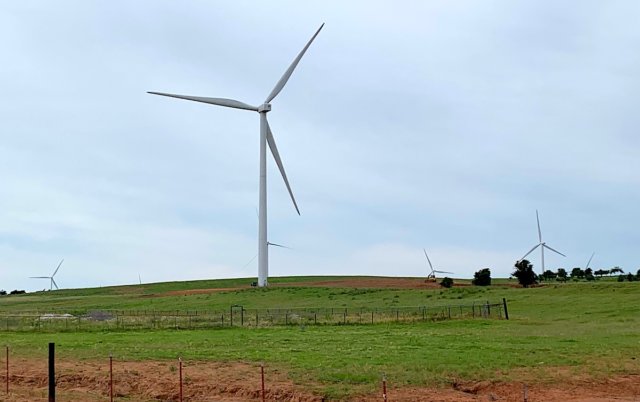
Renewable energy companies and Rep. Kevin West (R-Moore) are set to hold an Aug. 1 meeting at the Oklahoma State Capitol in an attempt to formulate a standardized property tax valuation system for wind farms. School districts and county officials are also expected to participate in the ongoing negotiation process, which seeks to put an end to the disagreements over wind project valuation that routinely cause lawsuits.
“The first meeting is just an effort to say, ‘OK, we all realize this isn’t healthy for counties, school districts or companies,'” said Mark Yates, vice president of the Advanced Power Alliance. “No one is winning in this.”
Yates has been working to bring parties together for a conversation about wind farm tax valuation for much of 2019, sending a letter (pasted below) on April 5 to county commissioners in 26 Oklahoma counties.
“Through no fault of our counties or the wind industry, the state of Oklahoma lacks consistency in its valuation methodology for these projects,” Yates wrote in the letter. “This creates challenges for you, and for the companies who are bringing billions in investment to our state. Consistency and predictability are two things that would serve both of our groups well. As an industry, we stand ready to actively engage all stakeholders, especially each of you, in a process to define a reasonable and agreed upon methodology that will help all of us succeed.”
West said the Aug. 1 meeting “will basically be like an interim study” and will run from 10 a.m. until noon in room 432A of the Capitol. He said he wants the process and any resultant actions to be fair to energy companies and the counties that assess property tax values.
“I’m hoping we can get something at least that is standard. I think everybody realizes it is still going to vary somewhat from area to area based on multiple things,” West said. “Best case scenario is we come up with something where we can actually put some legislation out there for this upcoming session. And an even longer term goal, I think this could also lay the groundwork — possibly — for some of the solar.”
West is far from the only legislator who hopes wind farm tax valuation can become more standardized.
“It does hurt the schools,” Sen. Bill Coleman (R-Ponca City) said of wind farm valuation lawsuits. “I think all parties need to get around the table and figure out a solution to it. Nobody is going to get their way 100 percent on everything, but not talking about it is not going to come up with a solution.”
Coleman and West both said the legal battles are particularly problematic for school districts owing to Oklahoma’s complicated common education funding equalization formula. At the turn of the calendar year, districts’ state funding is subject to a “mid-year adjustment” based upon enrollment fluctuation and locally assessed property taxes.
“As I understand it, I think the payments are on hold while the (legal) argument goes on about the evaluation,” Coleman said. “I do hear from superintendents, I can tell you that. They do have some concerns about it. There’s got to be a solution somewhere, but let’s hear from all parties first.”
Follow @NonDocMedia on:
‘No one wants to be in lawsuits constantly’
County officials also hope the Aug. 1 meeting is the start of a serious effort to avoid wind farm lawsuits in the future. Donise Rogers is the elected assessor of Major County and the current president of the County Assessor Association of Oklahoma, and she said she and at least one other assessor would be in attendance.
“We need to all come together with good ideas on how to fairly, equitably and uniformly value these (wind turbines) so we don’t have issues from county to county,” Rogers said. “No one wants to be in lawsuits constantly battling over the values of any kind of property.”
Grant County Commissioner Cindy Bobbitt agreed.
“A wind farm in Grant County ought to be worth the same amount of money as a wind farm in Custer County or Roger Mills County,” Bobbitt said.
First elected in 2004 before major wind energy investments in Oklahoma, Bobbitt the industry has “overall” been quite positive for Grant County.
“It’s really helped drive our economy, especially because our agriculture economy had such a downturn, and we had the bust of the oilfields,” Bobbitt said. “So it came in at a good time for us.”
But while Bobbitt praised the first two wind “partnerships” in Grant County, she said drama surrounding the Rock Falls Wind Project has frustrated her and other residents. While EDF Renewables ultimately abandoned an unusual agreement aimed at avoiding property taxes, the company has filed separate lawsuits challenging the wind farm tax valuation in Grant and Kay counties.
“I’m disappointed in Rock Falls because we build trust on partnerships, and when they were up here getting leases with our farmers, they were talking about how good this was going to be for our schools,” Bobbitt said. “I believe we’ve got about $1.3 million sitting in a protest account, and that money will not be distributed until the lawsuit is settled.”
Bobbitt said that has affected the 183-student Deer Creek-Lamont School District, which passed a $2.5 million bond in March 2018 despite uncertainty over the Rock Falls Wind Project’s ultimate tax liability. Newkirk Public Schools has also expressed frustration over the situation.
Rep. John Pfeiffer (R-Orlando) represents those communities. Like Bobbitt, he said he appreciates the industry’s economic benefits for rural Oklahoma but believes a standardized wind farm tax valuation format would be “helpful.”
“I think if the county assessors working with stakeholders can come up with a standardized assessment, that is great,” Pfeiffer said. “But the one thing we can’t do is take away power from our duly elected county officials to do their jobs.”
The Oklahoma Tax Commission’s 2019 business personal property valuation schedule does have two pages (embedded below) featuring guidelines for wind farm tax valuation, but the section specifies that “none of the content of this schedule is intended, in any way, to relieve property owners or assessing officials of their obligations by law to report, value, or assess personal property at its true and full market value.”
Shawn Hime, executive director of the Oklahoma State School Board Association, said depreciation rates appear to be part of the controversy over wind farm tax valuation.
“When you have those protests or other big property tax issues, the outcomes of those issues not only affect the local district but also the entire state funding system,” Hime said. “So if $1 million is lost in a protest in Woodward County, then that $1 million would be spread out across all the schools in the state as far as a loss.”
Hime said he did not know about the Aug. 1 meeting but called the idea “excellent.”
“It’s very important that they find a fair and equitable way to assess wind farms and to ensure that local schools have that understanding and assurance that the money will be there year after year,” Hime said.
 Loading...
Loading...
Advanced Power Alliance letter April 5
Dear Honorable County Commissioners
representing Beaver, Beckham, Blaine, Caddo, Canadian, Carter, Commanche, Custer, Dewey, Ellis, Garfield, Grady, Grant, Harper, Kay, Kingfisher, Kiowa, Logan, Murray, Noble, Osage, Roger Mills, Stephens, Texas, Washita, and Woodward:The distinction of what property is taxable, and at what value, has historically been the basis for significant debates in the State of Oklahoma. The valuation process of wind farm tangible personal property across your 26 counties continues to create challenges and debate as the renewable energy industry continues to grow and mature.
Through no fault of our Counties or the wind industry, the State of Oklahoma lacks consistency in its valuation methodology for these projects. This creates challenges for you, and for the companies who are bringing billions in investment to our state. Consistency and predictability are two things that would serve both of our groups well. As an industry, we stand ready to actively engage all stakeholders, especially each of you, in a process to define a reasonable and agreed upon methodology that will help all of us succeed.
We hope that you will have an interest in working with us in this process. In the mean time, I have received several questions on current valuation criteria so I wanted to share some points of information to consider:
According to the Oklahoma Department of Commerce’s 2019 Business Incentives and Tax Guide, the following items are eligible for the five-year Ad Valorem Exemption: new and expanding manufacturers, research and development companies, computer services and data processing companies with significant out-of-state sales, aircraft repair companies, and oil refineries.
• Similarly, other industries in Oklahoma also receive the Ad Valorem incentive, and protests of the valuation of properties is not unique to the wind industry.
• Additionally, Oklahoma law gives the Oklahoma Tax Commission (OTC) the exclusive authority to value exempt property, and provides no statutory right to appeal those valuations during the five-year exemption. This means that the industry has no standing to challenge the OTC’s valuation during the five year exemption period, which causes problems at the local level when standing is granted upon exemption expiration.
• The five-year ad valorem exemption to encourage development ended for the wind industry on December 31, 2016. As the final projects participating in the program reach the end of their eligibility, the challenges create by these questions of standing will end.
The Incentive Guide, on page 18, also defines the change in Oklahoma’s Constitution in 2013 regarding Intangible Property:
• “Effective January 1, 2013, intangible personal property shall not be subject to ad valorem tax or to any other tax in lieu of ad valorem tax within this State.” (Article 10, Section 6A)
• Simply stated, by Oklahoma law, the “intangibles,” such as federal and state tax incentives used to encourage the construction of the wind farm, must be measured and removed from the value of the tangible wind farm assets and are not subject to taxation.
• This is a critically important point which would explain the contested amount of the valuation in many cases.
Finally, by Oklahoma law, property is assessed at a fair market value, which is determined by a price a willing buyer and seller would agree to exchange for the asset in a voluntary sale.
• The “fair market value” does not equal the “cost” invested at the time the wind farm began operation.
• Additionally, the removal of the “intangibles,” as stated above, significantly impacts the price buyers would pay for the tangible wind turbine assets.
At a time when manufacturers in our state have been forced to shut down, and even hospitals have closed, the wind industry continues to make significant investments in the rural economies of Oklahoma. We are committed to continuing that investment and working with you to make certain that the benefits of these investments are felt across our communities.
We are still growing and investing in wind farms – without any incentives from the State of Oklahoma. More than 1,800 megawatts are in advanced stages of development which will bring more tax revenue to counties and school districts and support more families and ranchers with expanded land lease payments.
But we recognize that the communication process can, and must, be improved. The working group we envision with you will seek to bring county and industry voices together to prevent unexpected changes in valuation and to add the predictability and stability we all require.
Thank you for your time. Again, we look forward to working with each of you or your representative to study the valuation process and, together, develop a standard and consistent methodology for current and future developments.
Please do not hesitate to call or email me with any questions or feedback.
Sincerely,
Mark Yates
(Editor’s note: The Advanced Power Alliance has purchased advertising on NonDoc in 2019.)





















